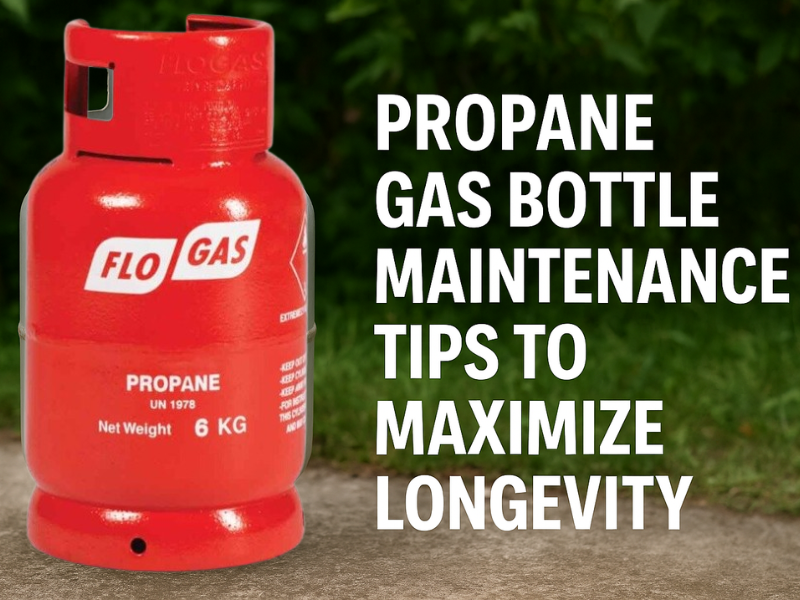Propane Gas Bottle Maintenance Tips to Maximize Longevity
Propane gas bottles are an essential energy source for households, businesses, and outdoor enthusiasts. Whether you use them for cooking, heating, camping, or running appliances, proper maintenance is the key to safety, efficiency, and maximizing the lifespan of your propane gas bottle. Neglecting care can lead to leaks, corrosion, or even safety hazards.
In this guide, we’ll walk you through practical propane gas bottle maintenance tips, covering everything from storage and cleaning to inspection and safe usage. By the end, you’ll have a clear strategy to extend the life of your propane gas bottle and keep it performing at its best.
Why Propane Gas Bottle Maintenance Matters
Propane bottles are built to be durable, but they’re not immune to wear and tear. Without routine care, issues like rust, faulty valves, and leaks can develop over time. Maintaining your bottle ensures:
Safety: Prevents gas leaks, fires, or explosions.
Cost-effectiveness: A well-maintained bottle lasts longer, saving you replacement costs.
Efficiency: Clean valves and regulators allow for smoother gas flow and better performance.
Compliance: In many regions, propane bottles must meet safety standards for inspection and re-certification.
1. Store Your Propane Gas Bottle Correctly
Proper storage is one of the most important steps in maintenance.
Outdoor storage is best: Always store propane bottles outside in a well-ventilated area. Never keep them in basements, garages, or enclosed spaces.
Keep them upright: Storing bottles upright ensures the pressure release valve functions properly.
Protect from extreme temperatures: Avoid leaving bottles in direct sunlight for long periods or exposing them to freezing conditions.
Use a protective cap: When not connected to appliances, keep the valve tightly closed and cover it with a protective cap.
Pro tip: Invest in a propane bottle storage cage if you keep multiple cylinders for added safety and organization.
2. Inspect Your Propane Gas Bottle Regularly
Routine inspections help detect problems before they become serious. Look for:
Rust or corrosion: Surface rust can weaken the cylinder if left untreated.
Dents or damage: Physical damage compromises the bottle’s structural integrity.
Leaks: Check for leaks using the soapy water test—apply a mixture of soap and water around the valve; bubbles indicate a leak.
Valve condition: Ensure the valve turns smoothly and isn’t loose.
If your propane gas bottle shows severe damage, it’s safer to replace it than attempt repairs.
3. Clean the Bottle Exterior
Dust, dirt, and moisture buildup can accelerate corrosion. To clean your bottle:
Wipe the surface with a damp cloth to remove dirt.
Use a mild detergent if necessary but avoid harsh chemicals.
Dry thoroughly to prevent rust formation.
Apply a rust-resistant spray or paint if minor rust spots are visible.
This simple cleaning routine helps your bottle withstand the elements longer.
4. Protect the Valve and Regulator
The valve and regulator are the most crucial parts of a propane bottle, ensuring safe gas release. To maintain them:
Always keep the valve cap on when not in use.
Inspect the regulator for cracks, loose fittings, or signs of wear.
Never attempt to lubricate the valve—it can interfere with operation.
Replace regulators every 10 years, or sooner if they show signs of damage.
5. Avoid Overfilling
Overfilled propane bottles can cause dangerous leaks. Most modern bottles come with an Overfill Prevention Device (OPD), which helps prevent excessive filling. Still, you should:
Only refill at certified refill stations.
Avoid DIY refills unless you’re properly trained.
Check that the weight doesn’t exceed the stamped tare weight plus propane capacity.
6. Re-Certify Your Propane Gas Bottle
Depending on your location, propane bottles need to be inspected and certified every 10–12 years. A qualified professional will:
Pressure test the cylinder.
Check for leaks and valve functionality.
Ensure it meets safety standards.
Without certification, refill stations may refuse to fill your bottle.
7. Use Proper Handling Techniques
Rough handling can shorten the lifespan of your propane bottle. Follow these safety tips:
Lift carefully: Avoid dropping or dragging bottles.
Transport safely: Always secure bottles upright in your vehicle during transport.
Keep away from sparks: Don’t place bottles near open flames or electrical equipment.
8. Keep Records of Maintenance
If you own multiple propane gas bottles, keeping a simple log helps track:
Refill dates.
Inspection dates.
Certification renewals.
This ensures none of your bottles are overdue for maintenance or safety checks.
9. Seasonal Care for Propane Bottles
Your maintenance strategy should also adapt to the season:
Summer: Keep bottles shaded and cool to avoid pressure build-up.
Winter: Protect from snow and ice; use insulated covers if necessary.
Camping season: Inspect bottles before taking them on trips to ensure safe outdoor cooking and heating.
10. Know When to Replace
Even with the best maintenance, propane bottles have a lifespan. Replace your bottle if:
The certification date has expired and it fails re-inspection.
There are deep dents or severe corrosion.
The valve is faulty and cannot be repaired.
Replacing old or damaged bottles is far safer than attempting repairs.
Conclusion
A propane gas bottle is a reliable energy source when cared for properly. With the right maintenance practices—safe storage, regular inspections, valve care, proper handling, and timely re-certification—you can maximize its longevity, reduce costs, and ensure safe usage for years.
Treat your propane bottle as an investment. By following the tips above, you’ll enjoy efficient, worry-free performance whether you’re heating your home, cooking outdoors, or powering appliances.
FAQs About Propane Gas Bottle Maintenance
Q1: How long does a propane gas bottle last?
A propane gas bottle can last 10–15 years with proper maintenance and regular inspections. After this period, re-certification or replacement is usually required.
Q2: Can I store my propane bottle indoors?
No. Propane bottles should always be stored outdoors in a well-ventilated area to reduce the risk of leaks and fire hazards.
Q3: How do I know if my propane bottle is leaking?
Perform the soapy water test around the valve and regulator. If bubbles form, it indicates a leak.
Q4: What should I do if my propane bottle has rust?
Minor rust can be cleaned and treated with rust-resistant spray. Severe rust, however, means the bottle should be replaced.
Q5: How often should I have my propane bottle inspected?
Inspect visually before every use and have it professionally certified every 10–12 years, depending on regulations in your area.
Q6: Is it safe to transport propane bottles in my car?
Yes, but they must be kept upright, secured properly, and never left inside a hot vehicle for long periods.
Q7: Do propane bottles expire?
Yes. Each bottle has a manufacture date and typically requires re-certification after 10–12 years. If it fails inspection, it must be retired.

